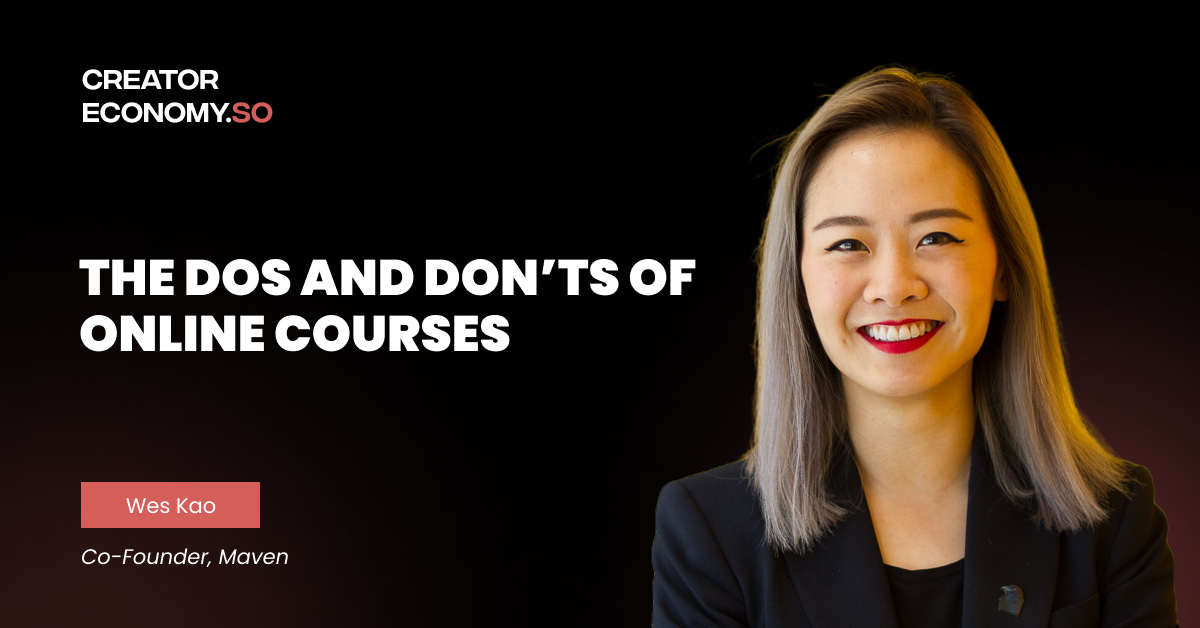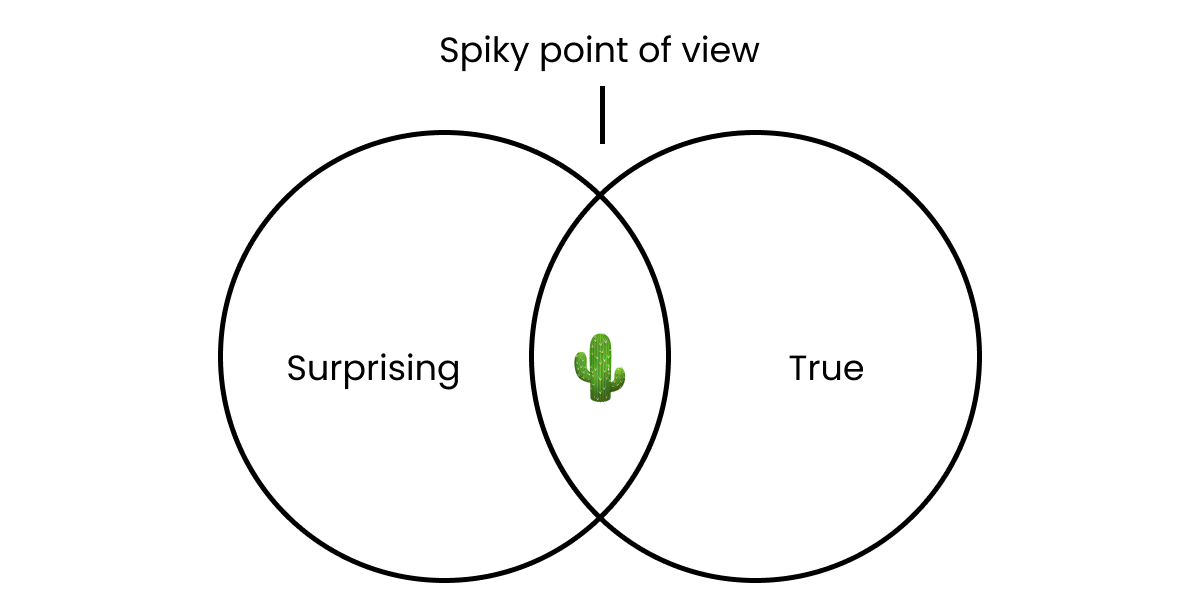Wes Kao (Co-Founder, Maven): The Dos and Don't of Online Courses
Wes Kao (Co-Founder, Maven): The Dos and Don't of Online CoursesHow to create, market, and teach online courses that earn $20K+ per cohortThis post is brought to you by Notion. Join teams like Figma and Pixar in using Notion's AI powered tools to manage your project. Try Notion Projects for free now. Dear subscribers, Today, I want to show you how to create, market, and teach a successful online course.
Don’t be one of them. Wes Kao is the co-founder of Maven, a course platform where instructors make $20K+ per cohort. In the interview below, we cover how to:
How to pick your course topicWelcome Wes! What led you to start Maven?
I was lucky to work with best-selling author and marketer Seth Godin in 2014. Back then, online courses were mostly asynchronous with <5% completion rates. The altMBA that I created with Seth was one of the first mainstream cohort courses. That experience made me realize that many experts had something to teach, even if they didn’t have a big audience. That’s why I decided to start Maven with my co-founder Gagan Biyani years later. We want to empower the world’s experts to offer amazing cohort courses. How do I pick a good course topic? Start by drawing a Venn Diagram with two circles labeled outside-in and inside-out. In the outside-in circle, list topics that people want to learn from you:
In the inside out circle, list topics that you want to teach:
Now look at the topics at the intersection of both circles. Pick one and fill out: “How to [achieve outcome] for [ideal student].” Your course will be more likely to succeed if:
How do I know who my ideal student is? Identify people who ask you questions about a topic that you’re interested in:
Should I only stick to topics that I’m an expert in? Yes. The world is not your oyster here — and that’s a good thing. A course is not the best format to explore your curiosity on a new topic. Instead, focus on topics that people already come to you for and that are part of your track record. What if I pick a topic that already has a lot of competition? How do I stand out? Build a spiky point of view — an unique perspective that others may disagree with. A spiky point of view isn’t about being controversial but rather about presenting a well-reasoned, evidence-based view that’s unique. For example, one of my spiky points of view is that you should market a course before creating it. Building a course before thinking about marketing often leads to crickets and tumbleweeds instead or real students. Build your spiky point of view by asking:
We all have spiky points of view within us; we just need have the courage to share. I love this concept. It could lead to haters but also people who deeply agree with you. Exactly. Sharing your spiky point of view makes you a beacon for like-minded people who think “finally someone said this” and want to dive deeper with you. Can you give examples of course instructors who have spiky points of view? Sure, here are a few examples:
All of these creators share their spiky points of view on social, email, and other channels to attract like-minded students to their course. How to market your courseLet’s say I have a spiky point of view but have 0 reach. How do I find students? Think about your funnel in three stages:
How should I price my course? The more expensive your course is, the higher the trust threshold is. Your ideal student is trying to answer: Has this person added enough value for me to trust them to buy their course? Consider also the price sensitivity of your ideal student. If you’re targeting new grads, they might only have enough to spend on a $150 on-demand course. Professionals, on the other hand, are willing to pay more for a course that can help them achieve an outcome in less time. Can you talk about an instructor who grew a course without an initial audience?
Yes! Shivani Berry teaches a course on leadership for women in tech. She was a PM at PayPal and had no followers or email subscribers. Despite this, she was able to consistently attract students:
The secret to Shivani’s growth is tapping into other people's audiences. Examples:
The takeaway is to provide value to companies and communities where your ideal student already hangs out. These can be workshops, interviews, and collaborations. Company workshops seem like an underrated tactic. It’s hard for companies to say no if you already have a few brand names under your belt. Exactly! It should feel like a no-brainer. The key is to add a ton of value in your free workshop and casually mention your course throughout. How to make students love your courseHow can you make your course interesting vs. monologuing through 100+ slides? Use the state change method - add a “state change” every 5 min to keep students interested. Examples of state changes include:
There’s really no excuse for monologuing given all these options. I think you made many readers interested in teaching courses just from this interview. How can someone get started? My advice is to keep it simple:
I didn’t follow this advice when I started. For example, I was stuck at 5K Twitter followers for 9 years because I tried to do too much (I’m at 150K now). I was posting on Twitter, LinkedIn, Medium, my blog, my website, and burning out. Focus is so important for both creators and product people. Focus on building the one thing that makes a difference in people's lives. I think that’s great advice to close on. How can people find you online? You can follow me on Twitter and LinkedIn. If you’re thinking of teaching a course, join my free Maven Course Accelerator for a step-by-step guide with other instructors. Thanks Wes! If you enjoyed this post, consider taking a few minutes to:
Creator Economy by Peter Yang is free today. But if you enjoyed this post, you can tell Creator Economy by Peter Yang that their writing is valuable by pledging a future subscription. You won't be charged unless they enable payments. |
Older messages
The #1 Equation for Making Irresistible Products
Wednesday, June 28, 2023
How to make an offer so good that people feel stupid for saying no
My 5 Favorite AI Prompts for Writing
Wednesday, June 21, 2023
The prompts that I return to the most often after 100s of hours with ChatGPT
How to Run Experiments That Don't Suck
Tuesday, June 20, 2023
A practical guide on when to run A/B tests and how to make them actually useful
Akshay Kothari (COO, Notion): How Notion Builds AI Products with the Community
Monday, June 12, 2023
How to build a great product community and what the team learned building Notion AI
Jackie Bavaro: How to Crack Your Product Strategy
Wednesday, May 31, 2023
Practical tips on how to define a product strategy and get buy-in for it across your org
You Might Also Like
From 0 to $5B (local non-US market)
Tuesday, March 4, 2025
I love that you're part of my network. Let's make 2025 epic!! I appreciate you :) Today's hack From 0 to $5B (local non-US market) Nadiem Makarim is a guy who managed to create
Quiet quitting is out. Revenge quitting is in? 😜
Tuesday, March 4, 2025
Do it loud. Do it proud, I guess.
Building complete rank and rent sites in just minutes
Monday, March 3, 2025
This tool is incredible
🌁#90: Why AI’s Reasoning Tests Keep Failing Us
Monday, March 3, 2025
we discuss benchmark problems, such as benchmark saturation, and explore potential solutions. And as always, we offer a curated list of relevant news and important papers to keep you informed
I interviewed THE largest Amazon Seller [Roundup]
Monday, March 3, 2025
Need funding for your Canadian Amazon business? Not sure if you should use a Canadian corporation or US LLC to form your company? We'll cover these questions and more in our Start and Grow Your FBA
The state of data-driven decision-making for CPG brands
Monday, March 3, 2025
How marketers use purchase insights to maximize campaign performance
Facebook updates, TikTok ROI, Instagram format matches, and more
Monday, March 3, 2025
Today's Guide to the Marketing Jungle from Social Media Examiner... presented by social-media-marketing-world-logo New week, fresh insights, Reader! Stay sharp with the latest updates on AI, social
Are you losing revenue to rivals?
Monday, March 3, 2025
This is a challenge that costs businesses millions every year: Their customers are switching to competitors for various reasons... even though most of them could easily be fixed. On Tuesday, March 4,
DeepSeek’s 545% Profit Claim
Monday, March 3, 2025
PLUS: Siri 2027?!
Insurtech VC resets, readies for growth
Monday, March 3, 2025
Europe's share of regional IPOs sinks; the agtech revolution is now; hope flares for natural gas deals Read online | Don't want to receive these emails? Manage your subscription. Log in The




